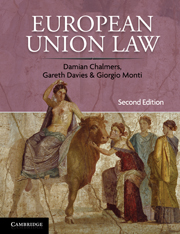Book contents
- Frontmatter
- Contents
- Map
- Preface
- Abbreviations
- Table of Cases
- Table of Treaties, Instruments and Legislation
- Table of Equivalents
- Electronic Working Paper Series
- 1 European Integration and the Treaty on European Union
- 2 The EU Institutions
- 3 Union Law-making
- 4 The EU Judicial Order
- 5 The Authority of EU Law
- 6 Fundamental Rights
- 7 Rights and Remedies in National Courts
- 8 Infringement Proceedings
- 9 Governance
- 10 Judicial Review
- 11 EU citizenship
- 12 EU Law and Non-EU Nationals
- 13 Equal Opportunities Law and Policy
- 14 EU Criminal Law
- 15 External Relations
- 16 The Internal Market
- 17 Economic and Monetary Union
- 18 The Free Movement of Goods
- 19 The Free Movement of Services
- 20 The Pursuit of an Occupation in Another Member State
- 21 Trade Restrictions and Public Goods
- 22 EU Competition Law: Function and Enforcement
- 23 Antitrust and Monopolies
- 24 State Regulation and EU Competition Law
- Index
14 - EU Criminal Law
- Frontmatter
- Contents
- Map
- Preface
- Abbreviations
- Table of Cases
- Table of Treaties, Instruments and Legislation
- Table of Equivalents
- Electronic Working Paper Series
- 1 European Integration and the Treaty on European Union
- 2 The EU Institutions
- 3 Union Law-making
- 4 The EU Judicial Order
- 5 The Authority of EU Law
- 6 Fundamental Rights
- 7 Rights and Remedies in National Courts
- 8 Infringement Proceedings
- 9 Governance
- 10 Judicial Review
- 11 EU citizenship
- 12 EU Law and Non-EU Nationals
- 13 Equal Opportunities Law and Policy
- 14 EU Criminal Law
- 15 External Relations
- 16 The Internal Market
- 17 Economic and Monetary Union
- 18 The Free Movement of Goods
- 19 The Free Movement of Services
- 20 The Pursuit of an Occupation in Another Member State
- 21 Trade Restrictions and Public Goods
- 22 EU Competition Law: Function and Enforcement
- 23 Antitrust and Monopolies
- 24 State Regulation and EU Competition Law
- Index
Summary
INTRODUCTION
This chapter considers EU criminal law and police cooperation. It is organised as follows.
(i) Section 2 considers the relationship between EU criminal law and internal security. EU criminal law is part of the area of freedom, security and justice and comprises three central competences. These are judicial cooperation in criminal matters; the establishment of minimum rules concerning the definition of criminal offences and sanctions; and police cooperation. However, these are all subject to Article 4(2) TEU, which states that protection of national security is the sole responsibility of each Member State. Furthermore, the German Constitutional Court has ruled that as the central elements of criminal law are pivotal to German constitutional identity, these must be decided nationally. This limits both the scope and the development of EU criminal law and has influenced its position within the Lisbon Treaty. Previously, it was governed by the largely intergovernmental arrangements of the third pillar. This has been abolished and, for the first time, full supranational disciplines now extend to cover EU criminal law. However, qualifications have been made. First, instruments adopted prior to the Lisbon Treaty retain their earlier status. The usual procedures concerning Commission enforcement actions and the preliminary reference procedure shall not apply to these for five years or until the instruments are amended. Secondly, ‘emergency brake procedures’ have put in place in relation to the law-making procedures in this field so that sensitive matters can be referred to the European Council.
- Type
- Chapter
- Information
- European Union LawCases and Materials, pp. 581 - 629Publisher: Cambridge University PressPrint publication year: 2010

